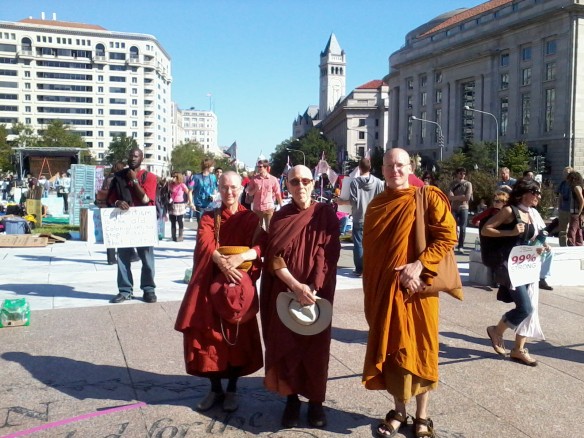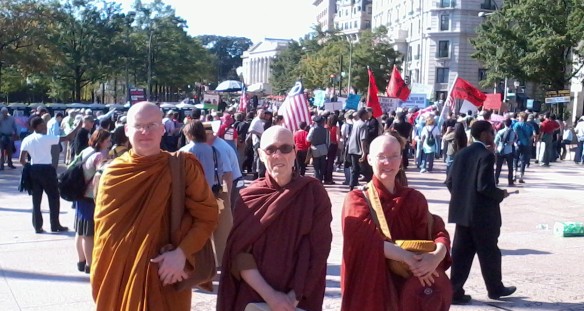
Venerables Bhikkhu Bodhi, Ajahn Guna, and Sister Santussika in Washington DC
After the Buddhist Global Relief (BGR) Walk to Feed the Hungry in South Bay CA, I was invited to spend time with Venerable Bhikkhu Bodhi at his residence in Chuang Yen Monastery, Carmel, NY. There were BGR meetings about to take place and were interested in having more Buddhist monastics involved in their programs. I accepted, and someone donated their frequent flier miles to fly me to the meetings, which were very beneficial. By having the chance to meet the board and hear more about the projects they are doing to relieve suffering in the world, I was inspired. Of course, this time of inspiration was a opportune moment for them to ask me if I would accept the position as the BGR Representative of Northern California, which I did at the request of Ven. Bhikkhu Bodhi. As the organization grows, there is the need to give talks, information, and coordinate events which are in line with the mission of BGR.
As I had recently given a speech about the need for spiritual leaders of all faiths to work together to inspire the faith of the masses to address the grave issues that threaten our planet and civilization, it felt right to “walk the talk” by accepting.
A day before I was ready to get on a plane for my return to Berkeley Buddhist Monastery, which is a nice place to return to, Ven. Bhikkhu Bodhi encouraged me to attend another gathering he was invited to in Washington D.C. called Stop the Machine! Create a New World! October 2011. Rabbi Micheal Lerner was scheduled to speak, and the hope that spiritual people would help bring wisdom to the event was in the air. As I had recently given a speech about the need for spiritual leaders of all faiths to work together to inspire the faith of the masses to address the grave issues that threaten our planet and civilization, it felt right to “walk the talk” by accepting.
Before going, I was curious as to what I was getting into, as I have never been an activist type, never have been arrested, never had gone to an event like this before ordination or after; I thought I would tune in to the current events nearby. Just about 90 minutes from my room in NY was the stage of the Occupy Wall Street Protests, in which over 1,000 people had been arrested (at that point). Reports of police brutality and videos were available on alternative media, while mainstream media tried to block it out. Whether it was the sight of innocent women and young men being slammed into the concrete, or the unnecessary and unprovoked use of mace, it was unsettling to say the least that this gross behavior was happening in my country. The news of protests increasing in many other major cities (estimated at 900) around America also were coming in as the energy of fed-up Americans increased.

If people around the world have the intention to make change for the better, then it will happen.
These Wall Street Protests gathered energy from the two weeks of sit-ins outside the White House, that had produced 1,252 arrests of opponents of the environment-threatening 1,700 mile Keystone XL tar sands oil pipeline from Alberta to Texas. Protests in Tahrir Square, Madison WI, and Canada also brought the momentum up too. The Buddha said that the mind is the forerunner of all things. If people around the world have the intention to make change for the better, then it will happen. That is how nature works.
There is not just one person to blame, but there is one person that we can work with to change for the better, and that is ourselves.
Of course, everyone will have to investigate the sticky issues of how we all have habits that are contributing in some shape or form to the problems we face. That is a hard fact to swallow. It is always easier to blame someone else or get righteously angry about what others should do. As to bringing the lens of investigation towards ourselves, without guilt but with wise attention, that is the beginning of some true practice. There is not just one person to blame, but there is one person that we can work with to change for the better, and that is ourselves.
The gathering in D.C. had it’s intention posted:
“I pledge that if any U.S. troops, contractors, or mercenaries remain in Afghanistan on Thursday, October 6, 2011, as that occupation goes into its 11th year, I will commit to being in Freedom Plaza in Washington, D.C., with others on that day or the days immediately following, for as long as I can, with the intention of making it our Tahrir Square, Cairo, our Madison, Wisconsin, where we will NONVIOLENTLY resist the corporate machine by occupying Freedom Plaza to demand that America’s resources be invested in human needs and environmental protection instead of war and exploitation. We can do this together. We will be the beginning.”
My feeling is that whether we want to talk about war, violence against ourselves or others, greed, destruction of the planet, or the way people in the West live in such an opulent and wasteful way, it all boils down to a moral issue. This is something proper for a spiritual person to speak about.
What is evident in America and now increasing around the world is that the materialistic culture of trying to get the “most for less” is destroying our cultures, homes, and societies.
Master Hua had the vision of creating schools where children would learn about the proper way of becoming a human being. Morality, respect, and integrity were all a major part of the curriculum. He saw that if children grew up with such values, then anything they would want to achieve in life would come to fruition in the right way. What is evident in America and now increasing around the world is that the materialistic culture of trying to get the “most for less” is destroying our cultures, homes, and societies. As a global community we are polluting the air we breathe, the food we eat, the water we drink, and our minds with greed. Contentment and gratitude are sidelined as the materialistic values teach discontent and competition. Of course from the Buddha’s teachings we know that the great pollutants of the mind are greed, hatred, and delusion. If we can understand these, then we will stop polluting the outside as well.
As a monk, I don’t have to be a part of one party or another—a Democrat or a Republican—because what I really care about is whether people care for each other and are willing to do what is right. It is time for our president and our government leaders to return to dignity and morality.
It is time for our president and our government leaders to return to dignity and morality.
We need to take a larger view. Many people feel that Obama has sold out. Where is his integrity with regard to the promises he made before entering office? Why are some politicians trying to stop what good things he is trying to do? Corporations seem to have the US government in their back pocket. People are asking, “What about the 99% of Americans that also deserve proper consideration?”, but these issues also effect the whole global community. In spiritual practice one tries to understand the root causes of problems and tries to fix them effectively. Being upset over the aftermath and then being surprised that the problems persist is not the way to make changes that are satisfying. There are consequences to war and hurting others.
What would change in my life? What would I feel? Attempting to understand the suffering of others is not an exercise in depression, but in opening to a new sense of wisdom and calm.
With compassion one can try to understand what it must be like for occupied areas of the Middle East. Can we imagine if the situation was turned around? It is always a challenge in practice to try to see the side that we are not experiencing first hand. Yet in reality, we do experience a lot of suffering, so on some level, if we really put effort into trying to understand, we can usually get closer to the truth than when we started. Still, when we experience the same situation that others have experienced, we finally know what it feels like to be in their shoes. I think that is how karma works. Until we really understand things, we have to experience situations time and time again until we “get it”. It is also important to have compassion for those who are suffering greatly instead of thinking that they are “just getting what they deserve”. We need to help everyone as much as we can through their difficult karma. And, if one group oppresses another group who is disadvantaged for some reason, then karmically the pain will come around and around. As for the cycle of war, I try to imagine what it would be like to be a victim of war. What would change in my life? What would I feel? Attempting to understand the suffering of others is not an exercise in depression, but in opening to a new sense of wisdom and calm. The world can make more sense, and we gain more friends in the process.
To be continued… part 2 will include reflections on the D.C. Protest and the teachings that Buddhist monks gave at the event to encourage non-violence.
